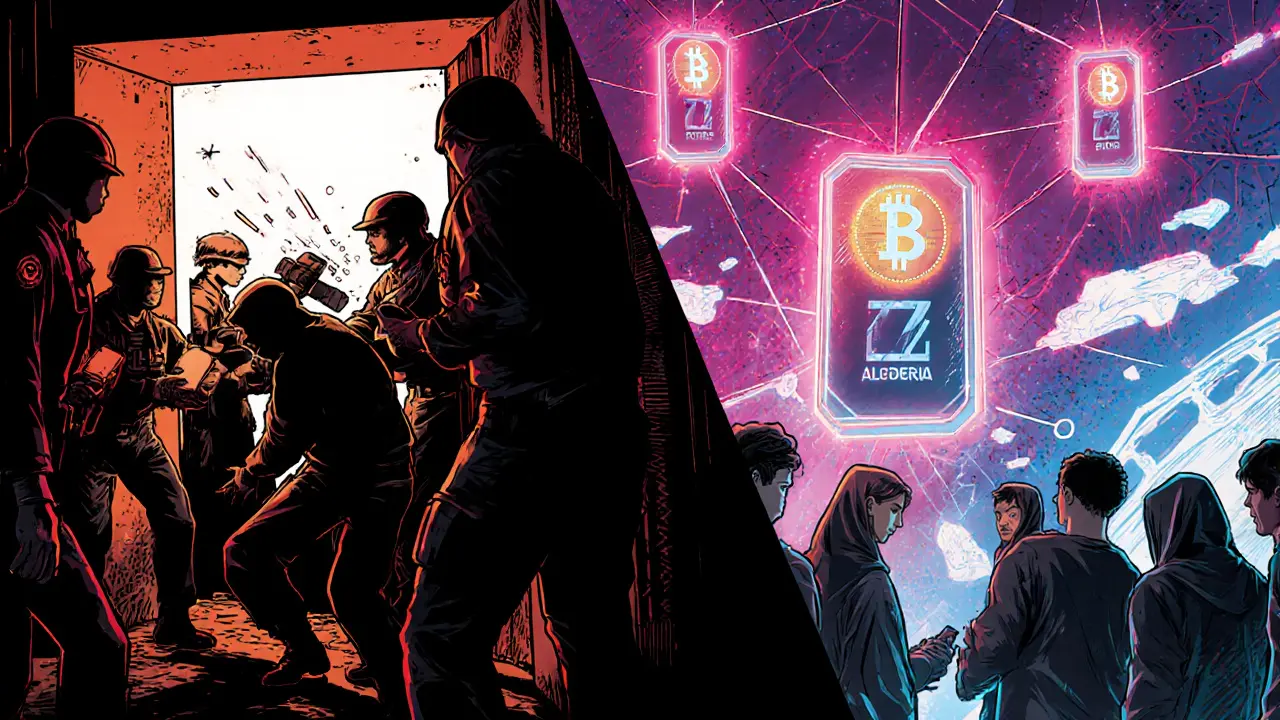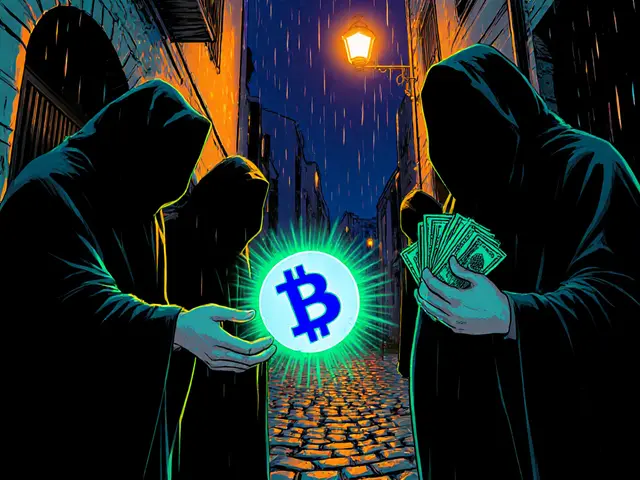Algeria Underground Crypto Cost Calculator
Calculate Underground Trading Costs
Based on article data showing 10-30% price premiums for crypto in Algeria's underground market.
When Algeria shut down every legal crypto activity, the underground crypto market in Algeria sprang up almost overnight. The July 24 2025 enactment of Law No. 25‑10 turned buying, selling, holding or even talking about digital assets into a criminal offense, yet the demand for crypto never vanished. Instead, users retreated into hidden channels, private chats, and encrypted networks, creating a shadow economy that mirrors the size of the country’s pre‑ban scene.
Why the Ban Exists and What It Covers
The law, officially published as Article 6 bis in the Official Journal, lists eight prohibited actions: issuing tokens, buying or selling crypto, using it as payment, holding any virtual currency, speculative trading, advertising crypto services, operating exchanges, and mining. Penalties range from two months to a year in prison and fines from 200,000 to 1 million Algerian dinars (≈$1,540‑$7,700). Repeat offenders can face double the fine and up to two years imprisonment. The government cites money‑laundering, terror‑financing, and consumer protection as reasons, and aligns the measure with Financial Action Task Force (FATF) guidance.
How the Underground Ecosystem Operates
Despite the draconian legal framework, three mechanisms keep crypto flowing under the radar:
- Peer‑to‑peer trading networks - Users meet on encrypted messaging apps, use VPNs to hide IP addresses, and settle trades with cash or local vouchers.
- Access to international exchange platforms - With a VPN, a savvy trader can log into Binance, KuCoin or decentralized exchanges (DEXs) that don’t require KYC.
- Use of stablecoins - USDC, DAI or BUSD act as a portable store of value that can be moved across borders without triggering the local banking system.
Because every link to a public exchange is illegal, participants favor privacy‑focused coins like Monero or Zcash, and they rely on decentralized protocols (Uniswap, PancakeSwap) that run on smart‑contract code rather than a central server.
Risk Landscape for Participants
Operating in this hidden space reshapes the classic risk‑reward equation. Below is a side‑by‑side view of the legal penalties versus the practical dangers of underground trade.
| Aspect | Legal Framework | Underground Reality |
|---|---|---|
| Potential Prison Time | 2 months - 1 year (up to 2 years for repeat) | Risk of arrest during raids, often longer detentions for suspected network leaders |
| Fines | 200 k - 1 M DZD (≈$1.5k‑$7.7k) | Asset seizure, additional punitive fees from smugglers, loss of entire portfolio |
| Liquidity | High - many local exchanges before the ban | Low - limited peer contacts, price premiums of 10‑30 % |
| Security | Regulated platforms, consumer protection | Scams, honeypot traps, no legal recourse if robbed |
| Operational Complexity | Simple wallet apps, bank integration | VPNs, encrypted channels, constant OSINT hygiene |
In short, the underground market forces users to trade at a discount, pay higher fees, and constantly watch for law‑enforcement sweeps.

Comparative Insight: Algeria vs. Other Ban‑Heavy Countries
China’s 2021 crypto crackdown offers a useful benchmark. Both nations saw a sharp dip in total market volume, but the underground segments grew. In China, the underground market settled at roughly 15‑20 % of pre‑ban activity; analysts estimate Algeria’s shadow market retains a similar share of its 2024 MENA ranking. The key differences are:
- China’s surveillance infrastructure is more advanced, leading to faster takedowns. Algeria relies on manual raids and limited cyber‑forensics.
- Algeria’s economy is more cash‑centric, so peer‑to‑peer cash‑in‑cash‑out remains viable.
- Both countries see price premiums for Bitcoin and Ethereum that can exceed 25 % compared to global spot prices.
These patterns suggest the underground market will persist as long as there is demand for cross‑border remittances, real‑estate purchases, or investment diversification.
Voices from the Field
Fintech analyst Amir Haddadi warned that the ban “sends a clear signal that Algeria does not want to experiment with decentralized finance.” He added that the move could push tech talent abroad, slowing the country’s digital‑economy aspirations.
Conversely, a senior officer at the Algerian Ministry of Finance argued that the ban protects citizens from “unregulated speculation” and aligns the nation with global AML standards.
Real‑world anecdotes are scarce-anyone who admits involvement risks a criminal record. However, on private Telegram channels, users report paying up to 0.5 % extra in fees just to reach a trusted peer, and they frequently rotate wallets every few weeks to avoid traceability.

Practical Steps for Anyone Considering Underground Participation
If you still find yourself tempted to dip into the underground market, follow this hardened checklist. Remember, the legal risks are real and can ruin lives.
- Secure a reputable VPN service that offers double‑hop routing and a no‑log policy. \n
- Set up a hardware wallet that never connects to the internet for long‑term storage.
- Use a disposable email and a burner phone number for every new trading alias.
- Prefer privacy‑coins (Monero, Zcash) for transfers, then convert to stablecoins at a trusted peer.
- Never reveal personal details-no real name, no job title, no address.
- Keep transaction logs encrypted with PGP; delete any evidence after the trade.
- Stay updated on law‑enforcement raids; exit the market if a sweep hits your city.
Even with these precautions, the chance of being caught or scammed remains high. The safest choice is to avoid crypto altogether until the legal climate changes.
Future Outlook: Will the Underground Market Survive?
Three scenarios loom:
- Enforcement fatigue - If the state lacks resources to chase every small trade, the market could stabilize at a reduced but steady level.
- Technological escalation - Advances in zero‑knowledge proofs, mixnets, and decentralized identity could make tracking even harder, extending the market’s lifespan.
- Policy reversal - Internal pressure from the tech sector or external investment incentives might force the government to relax the ban, converting the shadow market back into a regulated one.
For now, the underground market remains a high‑risk, low‑visibility funnel for those who refuse to give up crypto entirely.
Key Takeaways
- The 2025 Algeria crypto ban criminalizes all crypto activity, with prison terms and heavy fines.
- Underground operations rely on peer‑to‑peer trades, VPN‑accessed international exchanges, and stablecoins.
- Participants face legal jeopardy, asset seizure, inflated fees, and constant scam risk.
- Comparisons with China show a likely permanent, though smaller, shadow market.
- Future survival hinges on enforcement capacity, tech workarounds, and possible policy shifts.
Is it legal to own a cryptocurrency wallet in Algeria?
No. Under Law No. 25‑10, merely holding a crypto wallet is considered possession of a virtual instrument and is punishable by up to one year in prison and a fine of up to 1 million Algerian dinars.
How do Algerians trade crypto without getting caught?
Most rely on VPNs to hide their IP, use encrypted messaging apps for peer‑to‑peer deals, and move value through stablecoins on decentralized exchanges that don’t require KYC.
What are the typical penalties for first‑time offenders?
First‑time offenders can face two months to one year of imprisonment and a fine ranging from 200,000 to 1 million Algerian dinars (approximately $1,540‑$7,700).
Can I convert crypto to cash safely?
The safest route is to find a trusted peer who will exchange crypto for cash in person, but this carries a high risk of fraud and law‑enforcement infiltration.
Is there any sign the Algerian government might loosen the ban?
Experts say the ban could be revisited if the tech sector pushes back strongly or if the economic cost of missing out on digital finance becomes too high, but no official indication has appeared yet.


Peter Schwalm
October 26, 2025 AT 07:50Yeah, the risk profile has totally shifted since the ban. On one hand you’re dodging prison time, on the other you’re paying crazy premiums for Bitcoin on the street. The peer‑to‑peer networks are clever, but they’re also a hotbed for scams because there’s no regulator watching over the handshakes. If you do decide to dip your toe in, make sure you rotate wallets every couple of weeks and keep your VPN on 24/7. Bottom line: the upside is still there, but the cost of a mistake is way higher than before.
Marianne Sivertsen
October 30, 2025 AT 03:30It’s kind of a paradox, isn’t it? The state tries to wipe crypto out, yet the community finds new pathways that are more resilient than ever. I appreciate the ingenuity of those using stablecoins as a bridge, but the constant cat‑and‑mouse game with law‑enforcement drags everyone’s energy down. Remember that every extra step-VPN, encrypted chat, burner phone-adds a layer of operational friction. Sometimes the safest move is just to stay out until the legal picture clears up.
Shruti rana Rana
November 2, 2025 AT 23:10श्रीमान्, यह स्थिति एक नाटकीय नाटक की तरह दिखती है! 🎭 सरकारी प्रतिबंधों के पीछे भी, लोग Monero और Zcash जैसे प्राइवेसी‑कोइन्स को अपनाते हैं, क्योंकि वे ट्रेस‑असमान होते हैं। इस प्रक्रिया में, स्थिर कॉइन (USDC, DAI) एक जीवंत पुल बनते हैं, जो सीमाओं के पार सहजता से बहते हैं। 🔐💸 लेकिन इस छिपे हुए बाजार में घुसपैठ करने से पहले, एक मजबूत डबल‑हॉप VPN और हार्डवेयर वॉलेट रखना अनिवार्य है। अंत में, जोखिम को समझना ही सबसे बड़ा सुरक्षा उपाय है।
Stephanie Alya
November 6, 2025 AT 18:50Sure, because nothing says “wise investment” like paying extra fees to a stranger on a totally illegal market. 🙄
olufunmi ajibade
November 10, 2025 AT 14:30Listen, if you’re already in the game you need to treat every trade like a covert operation. Use a disposable email for every new alias and never, ever link a personal phone number to a crypto wallet. The fees may look small-like 0.3‑0.5 %-but they’re the tip of the iceberg; you’ll also face hidden costs from middlemen who demand a cut for “security”. Rotate your hardware wallet addresses after each transaction and store the seed phrase in an encrypted PDF on a cloud service you access only through Tor. Remember, the Algerian police have started monitoring Telegram groups, so the moment you post a public address you’re exposing yourself. Stay silent, stay hidden, and keep your stash offline unless you absolutely need to move it.
Manish Gupta
November 14, 2025 AT 10:10Operating under a blanket ban forces every participant to become a bit of a tech‑savvy security analyst. The VPN isn’t just a convenience, it’s the first line of defense against IP tracing. You also have to be wary of honeypot accounts that look legit but are actually law‑enforcement sting operations. Keeping transaction logs encrypted with PGP helps if you ever need to prove you weren’t the source of a leak. In short, the whole ecosystem is a high‑stakes cat‑and‑mouse game where vigilance pays.
Gabrielle Loeser
November 18, 2025 AT 05:50From a mentorship standpoint, the most responsible advice is to weigh the personal cost against the potential gains. While the underground market demonstrates impressive resilience, it also lacks consumer protections that regulated exchanges provide. If you value financial stability, consider alternative assets that aren’t subject to such aggressive legal scrutiny. Ultimately, the decision rests on your risk tolerance and willingness to navigate a hostile regulatory environment.
Rampraveen Rani
November 22, 2025 AT 01:30Wow! 🚀 Crypto life under a ban is wild! Stay safe, use VPNs!
Natasha Nelson
November 25, 2025 AT 21:10Indeed, the situation demands relentless caution, especially when dealing with decentralized exchanges that lack any central authority, and when each transaction can potentially expose you to legal repercussions, and the constant need to adapt to new surveillance tactics, which means you must keep your tools updated, your knowledge current, and your anonymity intact, otherwise a single slip could cost you everything.
Sarah Hannay
November 29, 2025 AT 16:50While I empathize with those seeking financial freedom, it is incumbent upon us to acknowledge that deliberately flouting the law undermines societal order and can inadvertently facilitate illicit activities. A measured approach that advocates for legislative reform rather than outright defiance would better serve both individual liberty and collective security.
Prabhleen Bhatti
December 3, 2025 AT 12:30From a fintech perspective, the Algerian underground market is essentially operating on a hybrid model of off‑chain OTC settlements coupled with on‑chain DEX swaps, which creates a layered liquidity curve that spikes at the edges of price discovery. The use of zero‑knowledge proofs could soon obfuscate transaction metadata to a degree where regulatory fingerprints become statistically insignificant. However, the current reliance on privacy‑coins like Monero introduces ring‑signature overhead, increasing transaction latency by roughly 15‑20 % compared to standard Bitcoin transfers. In practice, this means traders must balance anonymity with efficiency, especially when arbitraging the 25 % premium on BTC observed locally.
Chris Houser
December 7, 2025 AT 08:10That’s a solid rundown. Adding to it, the community could benefit from lightweight sidechains that anchor to major networks, offering faster settlement while preserving anonymity. Until such solutions gain traction, the best practice remains using hardware wallets for cold storage and only exposing a minimal amount for each trade to limit exposure.
Ashley Cecil
December 11, 2025 AT 03:50It is morally indefensible to encourage participation in an activity that the state has explicitly criminalized. By advocating for underground crypto use, one implicitly condones the erosion of legal frameworks designed to protect citizens from financial exploitation and potential terror financing. Ethical conduct demands adherence to the rule of law, even when the law appears restrictive.
John E Owren
December 14, 2025 AT 23:30I understand the appeal of decentralization, but let's keep the dialogue respectful and avoid incendiary language. Maintaining a calm tone helps everyone stay focused on constructive solutions without inflaming tensions.
Joseph Eckelkamp
December 18, 2025 AT 19:10Alright, let’s break this down step by step, because the Algerian crypto ban is a textbook case of policy overreach meeting stubborn market demand. First, the government’s draconian penalties-up to a year in prison and hefty fines-are meant to deter, yet history shows that prohibition often fuels a black market that’s more sophisticated than the legal one ever was. Second, the reliance on VPNs and encrypted messaging apps isn’t just a hobbyist’s pastime; it’s become the backbone of an entire financial sub‑ecosystem that mirrors the old street markets of old‑world economies. Third, the fact that users are gravitating toward privacy‑coins like Monero and Zcash illustrates a clear preference for fungibility and anonymity, which are precisely the attributes regulators fear. Fourth, the presence of stablecoins such as USDC and DAI as a “portable store of value” indicates that participants are seeking a hedge against local currency volatility while still staying under the radar. Fifth, the price premiums-often 25 % above global spot prices-are a direct cost of operating in a risk‑laden environment, and they serve as both a profit opportunity and a barrier to entry. Sixth, the lack of consumer protection means that scams and honeypot traps are rampant, so every trader must act like a security analyst, constantly vetting counterparties. Seventh, the legal framework’s blanket prohibition on “talking about crypto” creates a chilling effect on information sharing, driving knowledge into closed, invitation‑only circles that are hard for newcomers to penetrate. Eighth, the comparison to China’s crackdown underscores a key difference: Algeria’s enforcement relies on manual raids, which are slower and less technologically sophisticated, giving the underground market a relatively larger runway. Ninth, if the state’s resources become stretched, we can expect an enforcement fatigue scenario where small‑scale trades fly under the radar, stabilizing the market at a reduced but persistent level. Tenth, advances in zero‑knowledge proofs and mixnets could soon render even sophisticated surveillance ineffective, extending the lifespan of the underground economy. Eleventh, any potential policy reversal will likely be driven by economic pressures rather than ideological shifts, especially if the tech talent pool continues to erode. Twelfth, for the average Algerian seeking to protect wealth or send remittances, the underground market is currently the only viable pathway, despite its hazards. Thirteenth, therefore, risk mitigation strategies-such as double‑hop VPNs, hardware wallets, disposable emails, and encrypted logs-are not optional but essential. Fourteenth, the moral calculus for participants is complex: they must weigh personal freedom against legal jeopardy and the possibility of supporting illicit activities. Finally, the takeaway is clear: the underground crypto scene in Algeria will likely persist, evolving in sophistication, as long as demand exists and the state’s enforcement remains imperfect.
Dimitri Breiner
December 22, 2025 AT 14:50Bottom line: if you’re not ready to live like a spy, walk away now and wait for a sensible regulatory window.